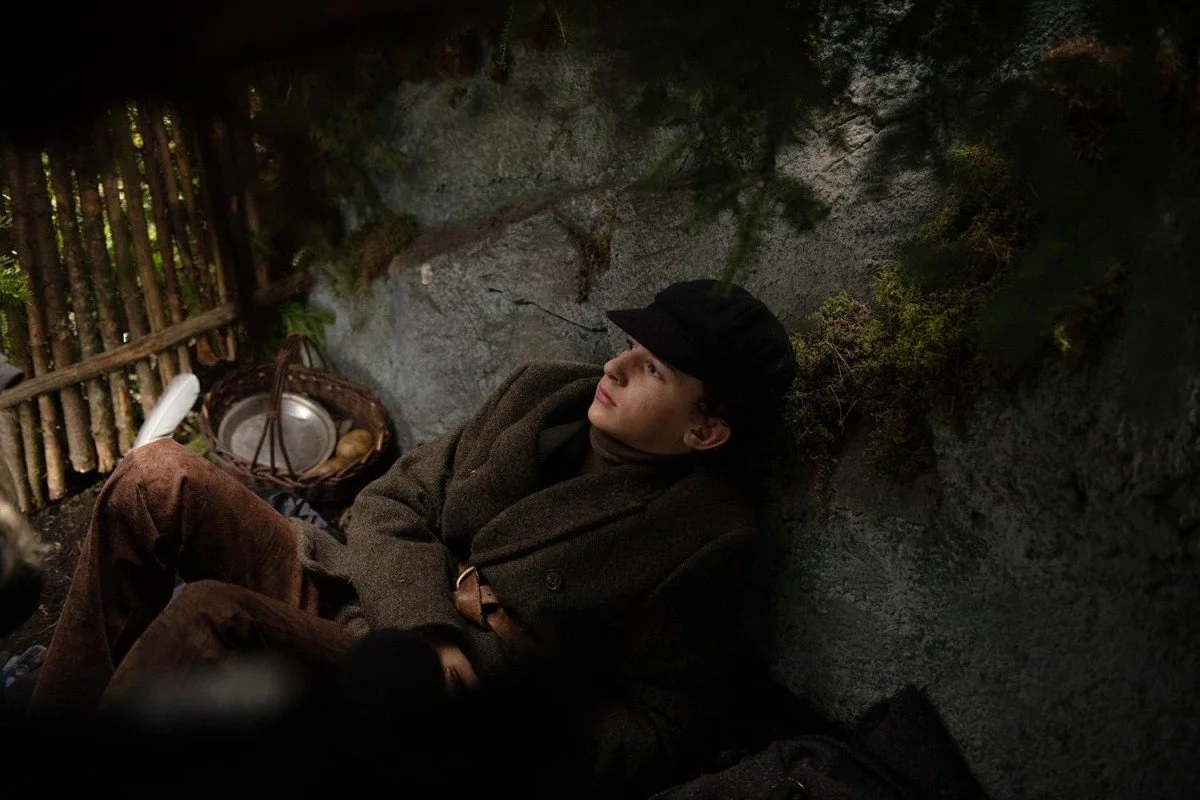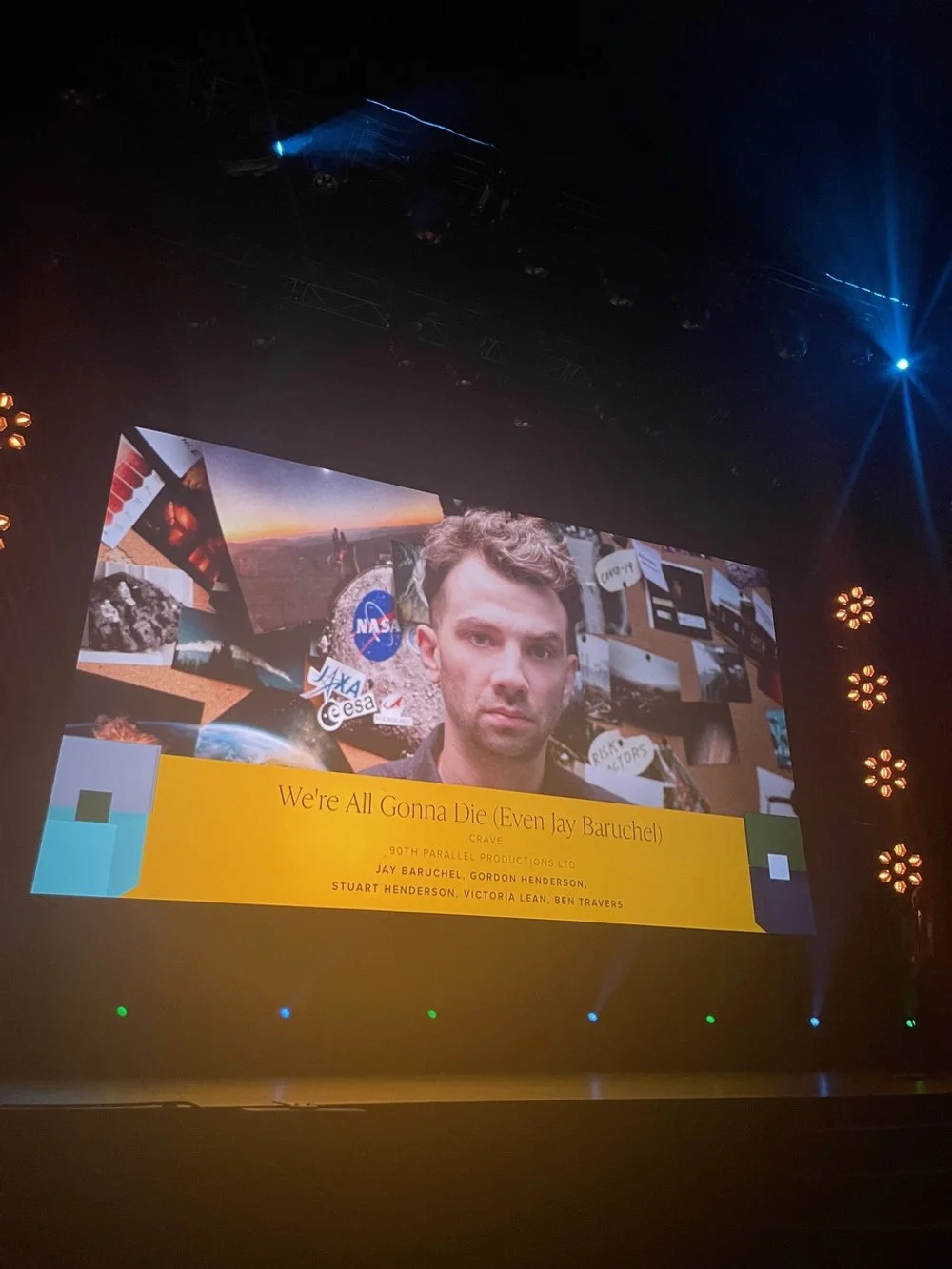As TIFF is coming around the corner, I had a moment to reflect this morning about my year. I looked back on all the wonderful people I have had a chance to work with and some truly outstanding projects. These I shall relate to you in a JAMES JOYCE rambling sort of way.
Leslie Headland on Directing: Female Directors ARE Cool
Today I was looking through my subscriptions online, TIFF / MUFF / DOC / WIFT / CCE / Criterion Collection. I love getting e-newsletters.
In the MUFF letter, particularly, I came across an article in The Times, about Women Directors.
The article was laid out beautifully, with portrait photography on a clean white backdrop of many Hollywood directors who are indeed women. The writing is clear, concise, and positive. It is not about condemning society or men for that matter, it is about recognizing the gap and bridging it through discussion, recognition, and change. We have to be the change to see the change!
Here is my favourite part:
"Leslye Headland is a 34-year-old writer and director who was in the same 2012 Sundance class as Trevorrow, with the movie version of her scorching Off Broadway play, ‘‘Bachelorette.’’ She bristles with ambition to do everything he is doing. Sitting in a red leather banquette at the Monkey Bar in New York, Headland told me she wants to be a Martin Scorsese, and ‘‘not just the female Martin Scorsese.’’ She wants to direct a James Bond movie, ‘‘even if I have to marry someone to get British citizenship.’’ She wants to make films in which women behave badly and are not held to a higher moral standard or seen as ‘‘less than.’’ She wants to look cool in magazine pictures so that ‘‘little girls will put female filmmakers on their Pinterest boards.’’ (Maureen Dowd, Nov. 20th, 2015, NY Times Magazine)
Can you imagine a society where a women in a power position is COOL. Man, I am on cloud 9 right now just thinking about it.
I shall end this with shock value, here re the blaring stats:
"In both 2013 and 2014, women were only 1.9 percent of the directors for the 100 top-grossing films. Excluding their art-house divisions, the six major studios released only three movies last year with a female director." (Maureen Dowd, Nov. 20th, 2015, NY Times Magazine)
Let's start championing directors equally. Not because they are men and not because they are women. But equally. By talent. Then we are levelling the playing field and creating a society that values success over gender. Film for thought!
- Jenn
An Hour with Jia Jhang-Ke | TIFF Festival 2015
One of my favourite directors coming out of undergrad was Jia Jhang-Ke. Having watched and written about The World (2000), I was fascinated by his ability to capture human emotion by isolating characters in digitally and architecturally distinct spaces.
When I looked at the programming this year for the TIFF 2015, I was flabbergasted when I saw his name appear. I wooped for joy. Loudly.
Jia Jhang-Ke and Cameron Bailey at TIFF 2015, Glenn Gould Studio, CBC, Toronto.
Jia was mesmerizing. Cameron Bailey was present to stir the conversation forward. Jia was calm, collected, and intelligent. He started by talking about his time in film school. China was changing socially, and people where struggling to understand themselves in this unsure environment. What really caught his attention is that people were NOT making films that reflected this movement.
Inspired by Hou Hao Hien (Chungking Express) and Vittorio Di Sica (Bicycle Thieves), Jia set out to capture a sense of beauty in realism. He described The Bicycle Thieves as
"[a film whose] visual moments are moving. [Moments we find] in every day life. [They are] both real and poetic." - Jia Jhang-Ke
They then discussed one of the major themes that runs through most of his films: alienation. Jia says that "loneliness is a big part of human nature." The Chinese culture before the social movement was group based. The shift to the individual is a strange moment. The struggle of the individual to create one's own self. The search for the self is often a lonely process.
This theme is captured in a very auteuristic style, if you will, one that we can see building over time in Jia's canon of films. Using mostly long takes, a certain sense of romanticism, and adding in fantasy / sci-fi elements to the story. With the advance of technology, devices are introduced into the narrative as a way to break up the plot. There is something futuristic about his films, poignantly heightened in The World. Not only do devices play a role in the internal plot, but also with the external world of the director. The advance of digital technology, Jia mentioned, is that he is able to achieve the look he wants with new equipment. The long take becomes economically viable.
The World (2004)
The World (2004)
Both the cinematographer, Nelson Lik-wai Yu, and Jia share the same desire to find beauty in everyday life. Having made every film together since 1998 and carrying this aesthetic forward.
Jia ended the conversation by saying that he and others have "responsibility as film artists." His focus is portraying change in people over time.
This is one experience that shall stay with me throughout life. Having heard him speak and being a long standing fan of his work, Jia's eye and directing sensibility stand top notch for me.
- Jenn
A Night with Jacob Tierney | Deanne Foley | Vic Sarin
After the 2015 DGC Awards Film Festival, TIFF hosted "Meet the Directors." This event featured three Canadian film directors: Jacob Tierney (Preggoland, 2014), Deanne Foley (Relative Happiness, 2014) and Vic Sarin (The Boy From Geita, 2014).
What delights me thoroughly at events such as this, is that they highlight Canadian talent, proving that we are indeed creative, strong, and innovative in the film industry.
Furthermore, when events ring FREE, industry people should flock to them... even if the Jays are in a playoff game.
What blows me away (still) with the three keynote speakers, is the diversity of talent on stage, and proving how creativity can play a major role in filming when the budget is small. Deane Foley admitted that they had 16 days to shoot the entire film.
I really felt attracted to each director in a different way. Jacob was at once personable, funny, and witty. Deanne was a major advocate for showing strong female characters in lead roles, and characters we don't normally see on screen. Vic Sarin was a WISE WISE man, offering philosophical advise that still resonates with me weeks later.
These are just a few of some of the words I heard:
"Gathering moments" in the editing room - Deanne Foley
"documentaries show, not tell" - Vic Sarin
"telling stories with unconventional female leads" - Deanne Foley
"documentary has to be as pure as possible. No narration. As is" - Vic Sarin
"I enjoy the journey of discovery. The idea has to grab me." - Vic Sarin
"each film takes me to a new place." - Vic Sarin
From dramedy, to strong female leads (who are flawed - yes, women ARE flawed too), to a powerful story, Canada sure seems to have it all.
Thank you DGC for organizing this event. I look forward to many more to come.
- Jenn
Angry Indian Goddesses: A Film for the Ages
Looking through the schedule before TIFF 2015, is daunting, to say the least. I found this pattern though when I read the descriptions and potentially checked out the trailer. If I felt some sort of connection to the story - like an energy coming off the page asking me to go to this screening - then it made my comprehensive agenda and I endeavoured to see it.
The greatest energy I received is from Pan Nalim's Angry Indian Goddesses (2015). A tale about a group of modern women in India all faced with issues of femininity. From gay marriage, to divorce, to being respected in the work place, being a mother, and finding happiness in life, this movie is truly packed to the brim.
"this is not a film, it is a platform of truths for various women" - Su (Sandhya Mridul), TIFF 2015
Within the first ten minutes, the whole theatre was shouting "YEAA" at the screen, as the girls fought back against gender stigmas and stood up for themselves in their daily lives. Onto my analysis:
1. This film took me to many places. A city, a rural and beautiful country side, a home, and an exciting night life. What struck me so much about this film is how modern it was. It did away with stereotypes and actually addressed real issues that are facing women today in India - not 50 years ago. There is a lack of male presence in this film, making the women strong protagonists on screen. Therefore this film took me through a truly unique and female perspective.
2. How did this film make me feel? WOW. I think the easier question is what emotion did I NOT feel. This was a rollercoaster ride. I was shouting for them, then I was feeling anxious for them, I was with them in the club dancing, and then I was vengeful and frankly sobbing by the end. These women, only bonded by their individual friendship with Frieda (Sarah Jane Dias), navigate their way through one wild week together on the coast of Goa. It is their friend's mysterious bachelorette party, of which, non of the women have seen her "fiance." The film is riddled with a powerful undercurrent, and it is electric. When the story takes a dark turn - and I mean stomach clenching, white knuckle, breathless turn - how do these women rectify the situation? How does the community stand together against bureaucracy, and how do we as audience members resolve the horrible events on screen?
3. How did this film educated me? Well I learned a lot about women on the other side of the world who face very similar issues that women here in Canada face. There is pressure to marry and pressure to have a family. I also learned that women in India face completely different issues: issue of rape and how frequently it happens (one every minute of the day), pressures on women to stay home and be a mother versus having a career of their own too, arranged marriage, what it means to be successful / a failure, and finally that India has not made it legal for homosexuals to marry. All these issues, complex matters, were addressed cinematically and truthfully in the film. The actors on stage after said that most of the acting was in fact improvised and real emotions all the women felt during each scene. Sometimes the director would give each women individual different instructions and put them all together in the scene and film the one take. That take showed real emotions as the women and their characters navigate through a complex and cruel world. The end, however, showed me something truly powerful and emotional: when the whole community stood up together, collectively as one, they were standing up for a cause greater than their village. It is something the world as a whole needs to do to protect its people and offer everyone equal opportunity.
4. Was the film fun? OF COURSE! It was not always focused on serious social issues. There were exciting friendship moments and heart warming moments as the characters began to change and accept themselves, their surroundings, their situations, and the need for change. When Su discovers her daughters loneliness and talent for drawing, when Frieda rescues Lakshmi and hires her back, when Jo inspires Mad to continue her work and creates a viral video of her singing. Indeed, Jo's character transcends the entire film, living on after her cruel death. Her beauty, charm, and wisdom becomes something of an ideology. Something worth fighting for. Something worth killing for. It is here that the film is so brilliant and delivers such an intense and engaging life TRUTH.
5. The transformative experience is prevalent throughout the narrative. And again I return to Jo's character as the catalyst: she convinces Lakshmi to end her bitter vengeance against the killer of her brother and to live life to the fullest everyday without hate; the group of traditional friends accept Frieda's love and marriage to Nargis, a socialist and protester; Jo films Mad singing one night and posts the video on youtube. This turns out to be the biggest break ever for Mad and propels her once meagre singing career into the spotlight and what we can only assume as success: Jo shows Nu a different side to her daughter, bringing mother and daughter closer together and tightening their familial bond: Jo talks to Pammy about fulfilling her entrepreneurial dreams as a business owner, against her husband's wishes and family desires. What Jo proves is that one moment of positive enforcement, one conversation that is meaningful is enough to enact change. And this change is strengthened through community. Coming together as one to fight for a just cause.
"I hope society grows up, and society will be equal in all possible ways" - Lakshmi (Rajshri Deshpande)
PLEASE PLEASE PLEASE go see this film. You will not be left unfulfilled. It is truly a turn of the century film. A female centred cast, a cast riddled with improvisations and real emotions captured eloquently on camera, a film that discusses REAL social issues that need to be addressed now. There is no turning back after seeing Angry Indian Goddesses.
"it was just us laid bare" - Mad (Anushka Manchanda)
READ MORE HERE:
FACEBOOK: Angry Indian Goddesses
OFFICIAL TIFF FESTIVAL: Angry Indian Goddesses
- Jenn
The Toronto International Film Festival 2015
The city was alive last week with the International Toronto Film Festival.
King street was a buzzin' from University to John street. The Hyatt was full of industry delegates and filmmakers from all over the world.
Here I found a home amongst other cinephiles - dare I say cinefilles.
From entertainment, to networking, dining out, and watching a selection of 300 hundred, it's no wonder why Cameron Bailey loves his job so much:
"I invite everybody to 300 birthday parties and show movies" - Cameron Bailey, Twitter.
As an industry member, I was fortunate enough to witness keynote speakers from across the creative spectrum:
- Justin Benson (Director, Producer, & Filmmaker) and Aaron Moorhead (Writer, Producer, & Filmmaker), the creators of SPRING (2014)
- Stephen Frears, director of THE PROGRAM (2015)
- Jia Zhang-ke, director of Mountains May Depart (2015)
- Bianca Goodloe, legal concierge - state of financing and co-production
- Nicolas Chartier, producer of A TALE OF LOVE AND DARKNESS (2015)
- Michael Moore, director of WHERE TO INVADE NEXT (2015)
- Barbara Twist (Art House Convergence), Mark Fishkin (California Film Institute), and John Vanco (IFC, NY)
- UPFRONT: Uncovering Unconscious Bias - Gender Issues
- David Garrett
- Phil Hunt (Producer), *thinks that MUFF is "brilliant"
- Asif Kapadia, director of AMY (2015)
- Avi Lewis and Naomi Klein, directors of THIS CHANGES EVERYTHING (2015)
Stay tuned the next few weeks where I will be highlighting the major speakers and my most memorable moments.
The movies were spectacular. At least the select few I was able to see (12). ANGRY INDIAN GODDESS shook the ground and wrenched out my heart. A movie everyone needs to see. LEGEND, a gritty tale based on the true story of the gangster Kray twins, East Enders in 1960s London. One close to home, BEEBA BOYS by the brilliant Deepa Mehta, also had be rivetted to my seat!
An unforgettable time with the best people!
- Jenn
Toronto's Film Resources
I'm a film tourist. I'll be the first to admit it. I'm scared to take the plunge and make my own film. However I am utterly engrossed in film culture. I read the magazines, I follow the twitters and I join the clubs. Film culture can be enjoyed by filmmakers and film lovers alike. They are great avenues for making new friends, networking, and discovering new work that you may enjoy. I'm lucky to live in Toronto which is home to a flourishing film culture.







